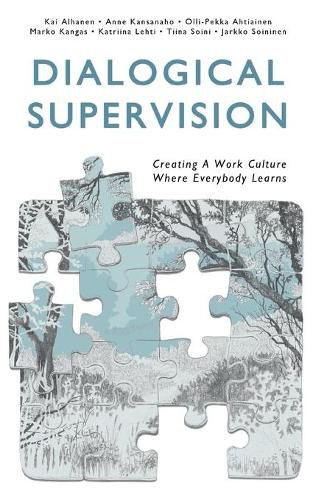Readings Newsletter
Become a Readings Member to make your shopping experience even easier.
Sign in or sign up for free!
You’re not far away from qualifying for FREE standard shipping within Australia
You’ve qualified for FREE standard shipping within Australia
The cart is loading…






This title is printed to order. This book may have been self-published. If so, we cannot guarantee the quality of the content. In the main most books will have gone through the editing process however some may not. We therefore suggest that you be aware of this before ordering this book. If in doubt check either the author or publisher’s details as we are unable to accept any returns unless they are faulty. Please contact us if you have any questions.
Dialogical Supervision: Creating A Work Culture Where Everybody Learns is a guide to professional supervision in various fields of expertise. It is written especially for professional supervisors and students of supervision, and yet it also provides insights and tools for those team leaders and managers who act as everyday supervisors for their employees. The work is composed as a practical handbook which offers a coherent theoretical description and practical implementation of a new kind of professional supervision. The book addresses the fundamentals of supervision: learning, reflection and dialogical interaction. It then presents guidelines for practical implementation, diverse orientations, and methods of supervision. The work also includes sections dealing with various types of supervision relationships: individual, community, group and managerial supervision. The different chapters of the book also contain several practical methods which together form a toolbox for supervisors . The basic premise of the book is to emphasise the importance of dialogue in creating a fundamentally different work culture to that which predominates. In celebrating economic growth, ruthless competition and individual achievement, this culture has led to an increasing fragmentation of people’s experiences and the loss of their sense of agency. At the same time, we need to solve extremely complex problems that require unprecedented creativity. In order to deal successfully with the challenges of modern work, we need to utilise the skills and knowledge of every single employee. This book offers clear methods for this to be realised.
$9.00 standard shipping within Australia
FREE standard shipping within Australia for orders over $100.00
Express & International shipping calculated at checkout
This title is printed to order. This book may have been self-published. If so, we cannot guarantee the quality of the content. In the main most books will have gone through the editing process however some may not. We therefore suggest that you be aware of this before ordering this book. If in doubt check either the author or publisher’s details as we are unable to accept any returns unless they are faulty. Please contact us if you have any questions.
Dialogical Supervision: Creating A Work Culture Where Everybody Learns is a guide to professional supervision in various fields of expertise. It is written especially for professional supervisors and students of supervision, and yet it also provides insights and tools for those team leaders and managers who act as everyday supervisors for their employees. The work is composed as a practical handbook which offers a coherent theoretical description and practical implementation of a new kind of professional supervision. The book addresses the fundamentals of supervision: learning, reflection and dialogical interaction. It then presents guidelines for practical implementation, diverse orientations, and methods of supervision. The work also includes sections dealing with various types of supervision relationships: individual, community, group and managerial supervision. The different chapters of the book also contain several practical methods which together form a toolbox for supervisors . The basic premise of the book is to emphasise the importance of dialogue in creating a fundamentally different work culture to that which predominates. In celebrating economic growth, ruthless competition and individual achievement, this culture has led to an increasing fragmentation of people’s experiences and the loss of their sense of agency. At the same time, we need to solve extremely complex problems that require unprecedented creativity. In order to deal successfully with the challenges of modern work, we need to utilise the skills and knowledge of every single employee. This book offers clear methods for this to be realised.